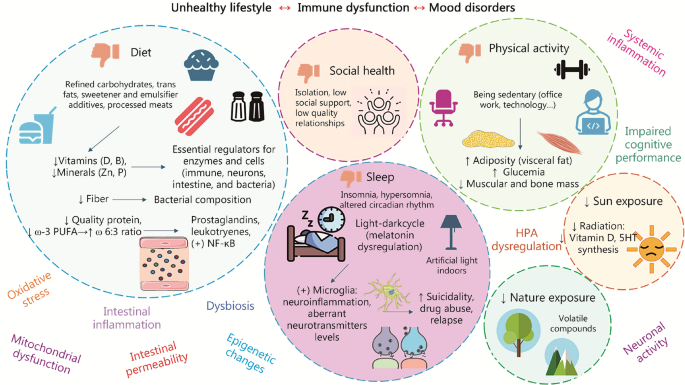What Are Mood Disorders?
Mood disorders are conditions that affect emotional state, motivation, energy levels, and overall mental clarity. These can range from mild mood swings or irritability to clinical anxiety and depression. While neurotransmitter imbalances (like serotonin, dopamine, or GABA) play a role, so do blood sugar stability, gut health, inflammation, trauma, and lifestyle patterns.
Mood changes are often early signs that something deeper is out of balance.
Common Types of Mood Disorders
Some of the most common mood-related concerns seen in functional medicine include:
Anxiety & Panic Attacks: Often linked to blood sugar crashes, gut-brain inflammation, or adrenal dysfunction.
Depression: Can be associated with low neurotransmitters, poor gut health, nutrient deficiencies, or chronic inflammation.
Brain Fog: A sign of impaired detox, mitochondrial dysfunction, or blood sugar instability.
Irritability or Anger: May be tied to hormone swings, low blood sugar, or liver congestion.
Bipolar Spectrum Mood Swings: May involve methylation imbalances or inflammation.
Postpartum Mood Changes: Often linked to nutrient depletion, thyroid dysfunction, or sleep disruption.
Signs and Symptoms of Mood Imbalances
Mood disorders can look different for each person, but common signs include:
Feeling easily overwhelmed or anxious
Sadness, hopelessness, or loss of motivation
Trouble focusing or feeling mentally “foggy”
Sleep disturbances (too much or too little)
Low energy or chronic fatigue
Irritability or anger outbursts
Loss of interest in hobbies or relationships
Appetite changes or sugar cravings
Feeling disconnected or numb
Mood Disorders in Women
Women may experience mood imbalances in connection with hormonal cycles or life stages like:
PMS or PMDD (severe mood changes before periods)
Postpartum depression or anxiety
Perimenopause-related mood swings
Estrogen or progesterone imbalances
Thyroid-related depression
Mood Disorders in Men
Men may experience different signs of emotional dysregulation, including:
Low motivation or energy
Withdrawal or irritability
Substance use to manage mood
Sleep disruption or physical tension
Poor stress tolerance or adrenal fatigue
What Causes Mood Disorders?
Mood disorders often result from an interplay of biological, environmental, and lifestyle factors. Functional medicine looks for deeper drivers like:
Gut-brain axis imbalances (leaky gut, dysbiosis, candida, or SIBO)
Chronic inflammation and oxidative stress
Blood sugar swings and insulin resistance
Nutrient deficiencies (e.g., B12, B6, magnesium, omega-3s, vitamin D)
Hormonal imbalances (e.g., thyroid, estrogen, cortisol)
Toxic burden (e.g., mold, heavy metals, plastics)
Trauma and nervous system dysregulation
Mitochondrial dysfunction and poor energy production
How Functional Medicine Supports Mood and Mental Wellness
Functional medicine takes a root-cause approach to mental health, aiming to rebalance the body systems that support mood, energy, and emotional resilience. Personalized care may include:
Comprehensive lab testing for inflammation, hormones, nutrients, and gut health
Anti-inflammatory, blood sugar-stabilizing nutrition protocols
Targeted supplements to support neurotransmitters, adrenal function, and detox pathways
Gut healing to improve serotonin and GABA production
Mitochondrial and brain antioxidant support
Nervous system regulation through breathwork, vagus nerve activation, or trauma-informed care
Lifestyle strategies to optimize sleep, light exposure, and movement
Note: Functional medicine is not a replacement for therapy or psychiatric care but can provide a vital layer of support by restoring physiological balance and improving your mental and emotional foundation.
Mood Disorders & Functional Medicine
Mood disorders such as anxiety, depression, irritability, and brain fog are often treated as purely psychological. But in functional medicine, we recognize that mental health is deeply connected to physical health—including inflammation, gut function, nutrient status, hormones, and the nervous system. Rather than masking symptoms with medication alone, we investigate why the brain and mood have become imbalanced and how to restore optimal function from the inside out.




